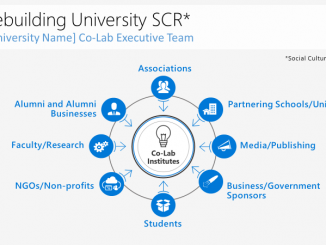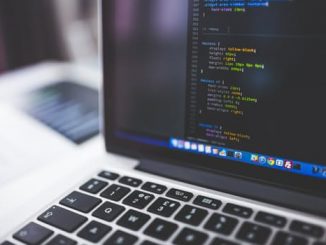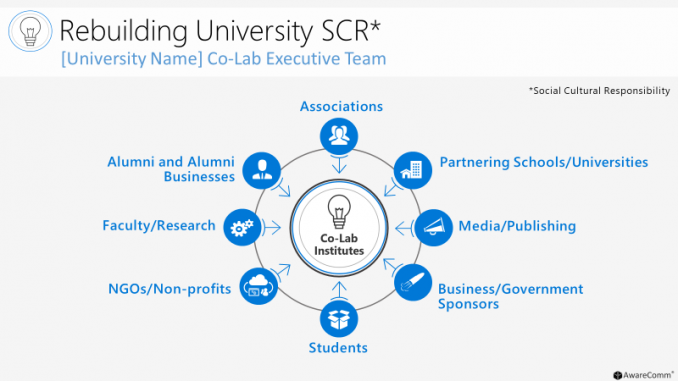
Opening Insights: Adapt or Die
We are in the midst of the 4th Industrial Revolution where technology and data continuously reshape the way we interact with our world. The times have changed and us with them. Did technology change us? No, that cannot be, as technology has no intent or higher purpose of its own. It is a resource that is wielded and shaped to fit the intent of the man behind the curtain.
“When something online is free, you’re not the customer, you’re the product.” 1
New measures are being introduced to protect consumers from those who have and would abuse the power of technology. The European Union’s rollout of the General Data Protection Regulation (GDRP) introduces critical requirements that will impact organizations across the globe from a marketing, research, data collection and storage standpoint. Universities are a key focus.
Institutions are to be held far more accountable for the protection of the data they hold; the regulation emphasizes the need for universities and organizations to maintain internal records of personal data, prepare data protection impact assessments for riskier processes and have clear privacy notices in place informing individuals about how their data will be used.
Where institutions rely on consent to process individuals’ personal data, they must also be able to demonstrate that this consent was ‘freely given, specific, informed and unambiguous’. For example, the common practice in the services sector of making access to public Wi-Fi conditional on granting consent to receive marketing information will no longer be lawful, since the two are unrelated. This may have implications for processes currently in place at institutions that rely on student consent for processing.
Collaborative research also faces uncertainty as individual member states are left to develop their own safeguards and limitations for research use of personal data. The concern is that a ‘patchwork’ of different data protection and privacy rules will emerge between EU member states, potentially complicating the practice of data sharing for European researchers.2
A brief review of GDPR requirements reveals severe punishments for non-compliance. Although necessary, the GDPR will have a tremendous impact on the relationship with and use of data for all organizations. These regulations come in response to irresponsible use of consumer data resulting from a lack of:
- Partnership with the source of the data
- Partnership with the collection of data
- Partnership with application of data
Adapting to the GDPR requirements is not an option.
The question is not what to do, but how and why to do it.
Can we implement the changes required by the GDPR in a way that would support sustainable research opportunities, while also empowering and transforming the university culture?
Informational Insights: Research Driven Cultures
Technological progress has merely provided us with more efficient means for going backwards.
ALDOUS HUXLEY, ENDS AND MEANS
Consumer manipulation has been ongoing since the 40’s (the influence of the Father of PR/Propaganda, Edward Bernays) and exacerbated by profiling and social media. According to MacRoberts, currently, only 1 in 4 adults trust businesses with their private data.3 Blind trust of technology is a thing of the past.
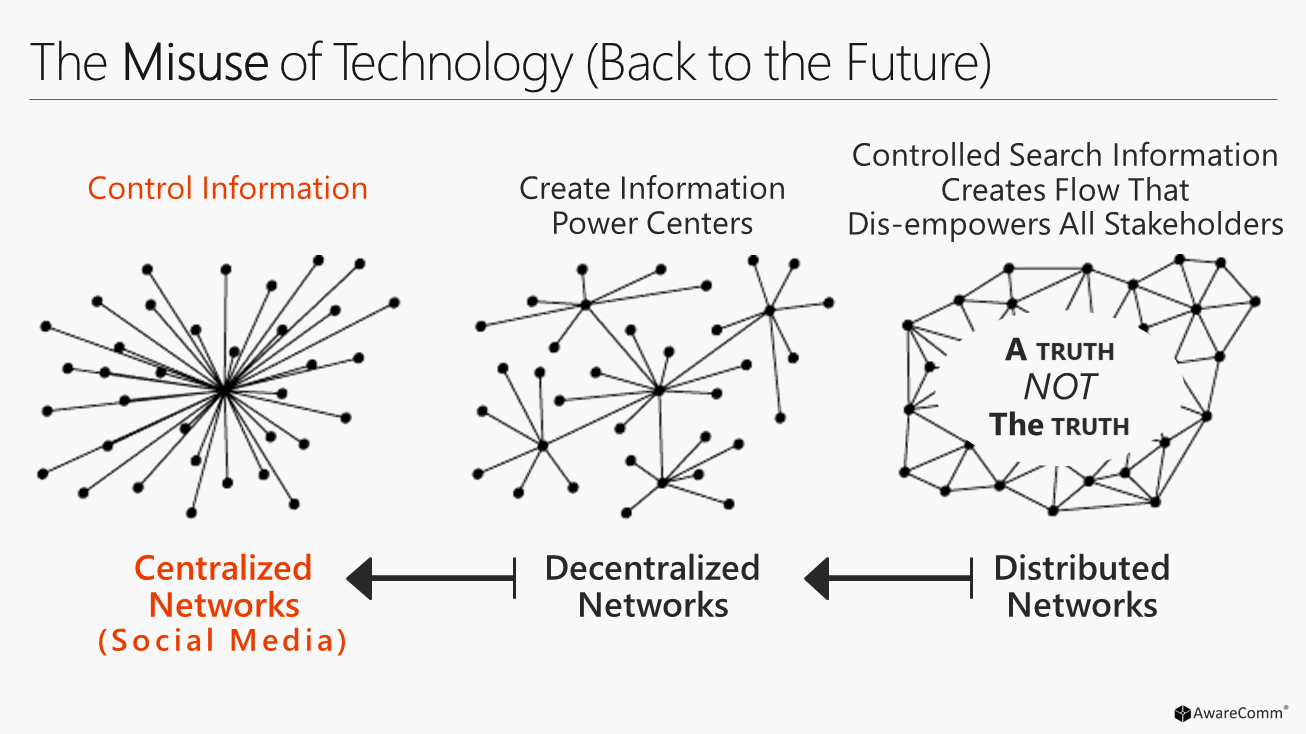
The centralized network that social media and search engineers have created are equivalent to monopolies that house and use our data for their own power games. The first president of Facebook stated in 2017: social media giants are knowingly and deliberately “exploiting a vulnerability in human psychology.”
People will come to love their oppression, to adore the technologies that undo their capability to think.
ALDOUS HUXLEY
Now we have several generations of youth who have been so poked, liked, friended and followed by everyone else that they have no idea who they are. Thus, they seek and demand a SAFE SPACE. The GDPR demands the same thing.
The GDPR aims to address the mistrust in data processing and give consumers greater control over their data. A bi-product of this regulation creates the opportunity for organizations to foster TRUST-BASED BUSINESS RELATIONSHIPS. The return of the customer is king business model.
Realities of GDPR
In an ideal world the GDPR, puts technology on a path of innovation and discovery – with distributed networks that empower all stakeholders with reliable and credible information. In fact, this intention is explicitly stated in the GDPR’s exemptions of consent and processing requirements for research purposes.
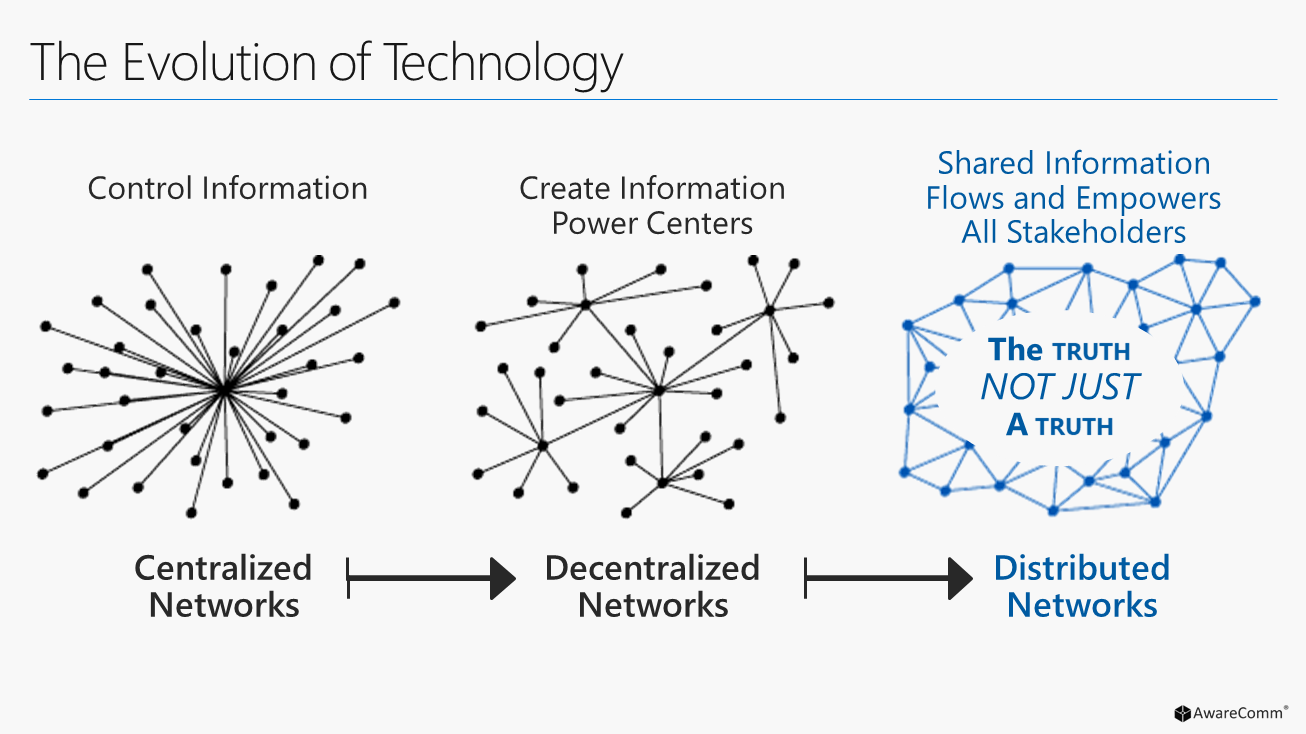
BUT in reality, WHAT’S REALLY GOING TO HAPPEN?
GDRP is going to do nothing to prompt, the big tech companies, Facebook, Google and the rest, to clean up their act. They have the legal budget to skirt any legislation. The problem is, the consumer will never trust them again or the companies that use or depend on them. Mass media has violated consumer confidence and that is irreparable.
Technology drives economic development. Yet, a huge wave of consumer distrust has hit the marketplace with many people becoming more discerning and less disclosing of their personal data and opinions. The GDPR provides clear consent directives in favor of the consumer. Many consumers are looking forward to the opportunity to opt-out of data collection, this has the potential to skewed and distortion market research and data. This will result in a total misrepresentation of the market.
The economic impact will not be an improvement on the quality of life,
but rather results in confusion for all stakeholders.
RICHARD JORGENSEN
Much like the current climate of trust in America regarding the mainstream mass media. Media organizations have violated consumer confidence in a way that is irreparable. Given the choice, consumers will opt out of sharing their data and many will select the option for personal data deletion.
What will happen to the university environment? How will universities safeguard an already volatile space?
University Safe Space Powered by Research
The problem with technology is not technology itself but the intended purpose, application and implementation. While technology continues to advance, machines will always lack the human element (link to human intelligence book). While companies like Facebook, Google and a like, are positioning to buck the GDPR, ethical organizations like Microsoft and Awareness Communication Technology, LLC (AwareComm ®) are partnering to align with the intent of the law. Working together to empower businesses, organizations and schools with the tools to implement the regulations, not because they have to, but because they choose to. Providing tools to change in a changing world.
We are not pursuing Artificial Intelligence to beat humans... we are pursuing AI so that we can empower every person and institution that people build with tools of AI so that they can go on to solve the most pressing problems of our society and our economy, that's the pursuit.
SATYA NADELLA
AwareComm® is introducing Collaboration Laboratory (Co-Labs) Research Partnerships with universities around the world. These Co-Labs are being established as research partnerships, rooted in principles, to:
- Create a Readiness for Change (For ALL)
- Support Effective Data Privacy, Transparency and Security
- Develop Mature &Productive Graduates (Critical Thinkers)
- Overcome Millennial Attitudes, Problems & Safe Space Mentality
- Engage Alumni in Sponsorship & Mentoring Programs to Ensure Sustainability
- Empower University Cultures (All Stakeholders) to Work as Interdependent Teams
- Reduce the Talent Shortage: Bridge the Expectation Gaps (School-University-Business)
Co-Labs are limited liability, privately-owned research partnerships.
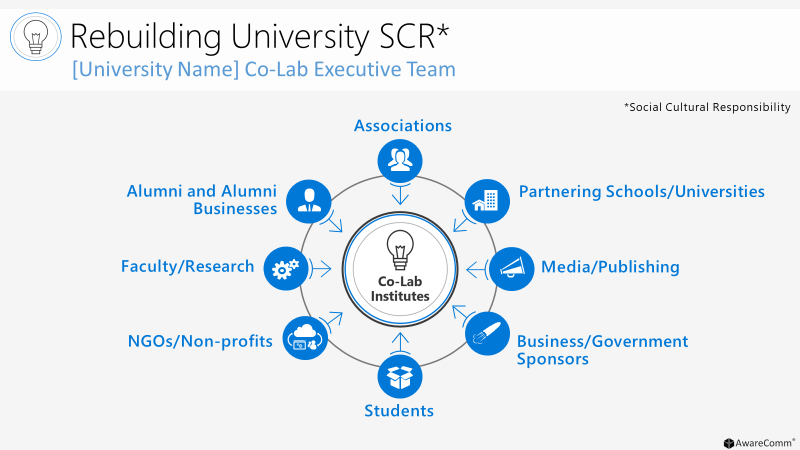
Co-Labs provide guidance for universities to take charge of their collected stakeholder information and to determine how it will be used following ethical guidelines built on system of principle-based transparency. The driving element will be choice. Will people opt-in or opt-out?
The architecture of the Co-Lab™ provides participants and contributors with a customized feedback dashboard, as well as the tools to assess and discern their feedback (i.e. become an informed consumer). The personal dashboard meets GDPR requirements provides:
- Helpful information,
- Progress reporting,
- Sentient analysis and
- Comparison aggregates (ensuring a safe space online, while supporting self-discovery within).
This comprehensive dashboard provides the informed consumer (critical thinkers), with critical information to track their personal progress and process, and to examine themselves in relation to the rest of the Co-Lab Network (i.e. how many students chose Socrates as the topic of their term paper and why).
For example, the Co-Lab™ dashboard provides people and students with the choice to opt-in or opt-out. However, they will be made aware of the pros and cons of their choice long-term and short-term as it relates to their education and professional development.
- PERSONAL BENEFITS: Opt-out will result in a dashboard that contain only personal benefits – personal and sensitive data and no comparison data for example. This will limit one’s ability to examine the insight and progress of self in comparison to others, as well as limit the ability to learn from.
- NETWORK / COLLABORATIVE BENEFITS: Opt-in will result in a dashboard that contains personal and network benefits – personal and sensitive data and comparative data. The comparison data will show an aggregate (where do you stand in relation to your peers - alone or together within the sea of people in the world and on the internet?).
While deceptively simple, the Co-Lab platform and process provides the tools and resources needed to support students and network members in building skills of perception, critical thinking, creativity and communication. This creates an ongoing educational research environment of true higher learning and life-long learners.
I think it’s important that students going through our higher education system do learn to be resilient and deal with controversial opinions, to deal with views that challenge their most profoundly held beliefs or views that simply make them uncomfortable.
Because if we fail to do that we will soon be on a slippery slope that ends up with a society that is less able to make scientific breakthroughs, less able to be innovative and frankly less able also to resist injustice. We need people to be able to deal with the uncomfortable.
JO JOHNSON, UK UNIVERSITIES MINISTER, 2017
Research Considerations
The deepest sin against the human mind is to believe things without evidence.
ALDOUS HUXLEY
Prior to becoming a commercial industry, education relied on research and the search for evidence-based practices.Today, we see the need for data science to go beyond algorithms and focus on how we collect data to ensure reduction in confirmation bias, minimize skewed data and create replicatable evidence-based (practical) solutions.
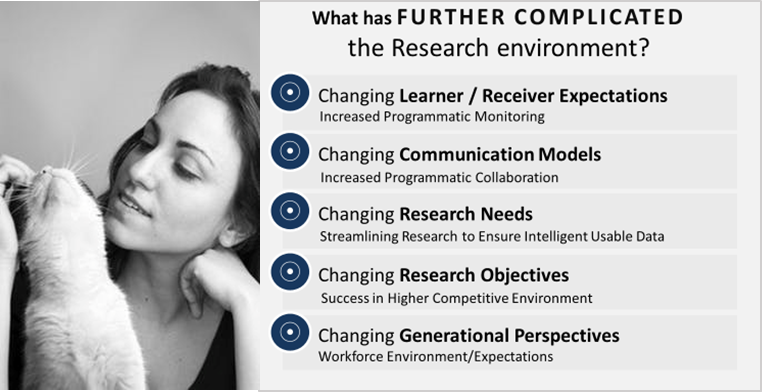
The GDPR adopts a “broad” definition of research, encompassing the activities of public and private entities alike (Recital 159). In the age of big data, where the data analytics activities of many organizations may qualify as research, it is unclear exactly how far the GDPR’s research exemption will extend. One thing is clear, however: The GDPR aims to encourage innovation, as long as organizations implement the appropriate safeguards.
Although the GDPR creates heightened obligations for entities that process personal data, it also creates new exemptions for research as part of its mandate to facilitate a Digital Single Market across the EU. Specifically, the GDPR exempts research from the principles of storage limitation and purpose limitation so as to allow researchers to further process personal data beyond the purposes for which they were first collected. Research may furnish a legitimate basis for processing without a data subject’s consent. The Regulation also allows researchers to process sensitive data and, in limited circumstances, to transfer personal data to third countries that do not provide an adequate level of protection. To benefit from these exemptions, researchers must implement appropriate safeguards, in keeping with recognized ethical standards, that lower the risks of research for the rights of individuals.4
AwareComm® is revolutionizing the data science world with its patent-pending Sentient Analysis™ data gathering and analysis process. The process incorporates the Socratic Method and copyrighted relational models to effectively quantify human behavior – to support and empower rather than manipulate like contemporary data analysis methods.
Thus, to encourage research and development, AwareComm® provides a quick, easy and effective way (see model below) for Co-Labs to get established and funded as research institutes. The model ensures Co-Labs are implemented, funded and sustained through businesses and universities, with third party credibility and data assurance.
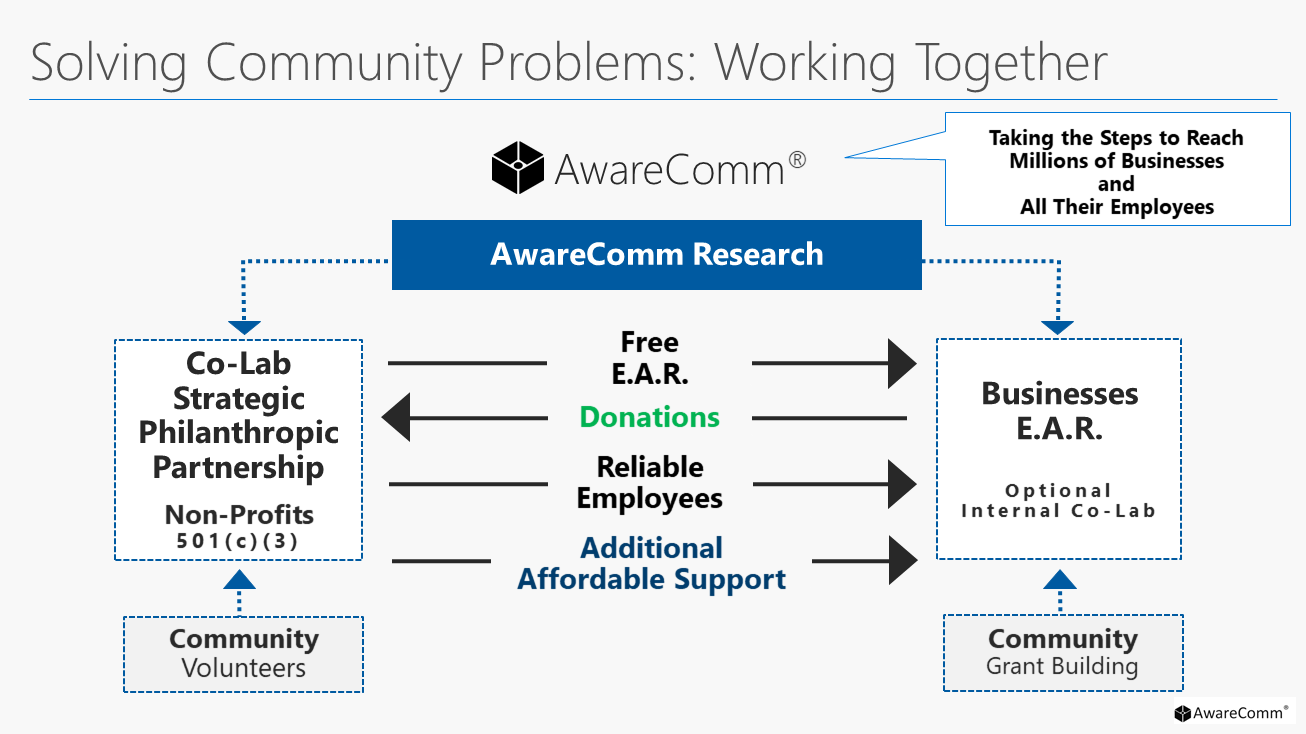
This symbiotic relationship ensures sustainability of all stakeholders through - investment and recurring benefits from the partnership.
Plan (sample) For Universities
- Form Co-Lab Team
- Define Problems
- Community/Country Problems
- University Cultural Problems – Student and Staff
- University Financial Problems
- Research and Sustainability Problems
- GDPR
- Data Collection, Analysis, Reporting
- Define Answers
- Collaborative Solution
- Transformational Change
- Readiness for Change
- Experiential Learning
- Applied Knowledge Transfer™
- Sentience Analysis™
- Research Tools
- Define Co-Lab Solution
- Bottom-Up Student-Centered Empowerment (Critical Thinking)
- Bottom-Up Faculty Employee Engaged Culture
- Community Development SCR
- Alumni Mentoring
- Co-Lab Research Process
- Experience
- Task
- Performance
- Examination
Possibilities for Consideration: Integrity, Transparency & Accountability
With large-scale change on the horizon it is easy to be fearful of the unknown. When change occurs, we may choose to ignore what is coming, wait for it to run us down and fight as it takes charge of our lives. Conversely, we may choose to get out in front with a plan and meet the charge head-on, partner with it and shape the future.
- What if universities could create a readiness for change (for all)?
- What if universities could support effective data privacy, transparency and security?
- What if universities could develop mature &productive graduates (critical thinkers)?
- What if universities could overcome millennial attitudes, problems & safe space mentality?
- What if universities could engage alumni in sponsorship & mentoring programs to ensure sustainability?
- What if universities could empower university cultures (all stakeholders) to work as interdependent teams?
- What if universities could reduce the talent shortage: bridge the expectation gaps (school-university-business)?
- What if universities could ensure sustainable research grants and sponsorship?
- What if universities could empower collaborative research participation and contribution?
- What if universities could empower students, faculty and stakeholders with skills of perception, critical thinking, creativity and communication?
- What if universities could fuel businesses and the economy with a workforce that is mature, capable, creative and hardworking, rather than the work-phobic, talent-less labor force we currently see?
- What if universities could be the respected institutions that create environments that support, liberate and teach principles, values and heritage rather than provide environments of entitlement, narcissism and crowd conditioning?
Add Your Insight: Collaborate for Success
Data protection is not about:
“…Merely being a technician, it is about putting the consumer first.”
ELIZABETH DENHAM. INFORMATION COMMISSIONER UK
Sources:
1 https://blogs.harvard.edu/futureoftheinternet/2012/03/21/meme-patrol-when-something-online-is-free-youre-not-the-customer-youre-the-product
2 https://universitybusiness.co.uk/Article/preparing-for-the-gdpr
3 https://www.macroberts.com/consent-getting-it-right-under-the-new-rules-gdpr-part-1-what-is-consent
4 https://iapp.org/news/a/how-gdpr-changes-the-rules-for-research

